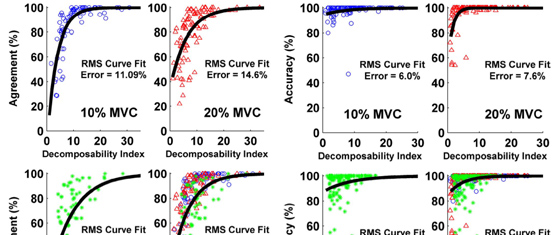
Abstract
The reliability of clinical and scientific information provided by algorithms that automatically decompose the electromyogram (EMG) depends on the algorithms’ accuracies. We used experimental and simulated data to assess the agreement and accuracy of three publicly available decomposition algorithms—EMGlab (McGill et al., 2005) (single channel data only), Fuzzy Expert (Erim and Lim, 2008) and Montreal (Florestal et al., 2009). Data consisted of quadrifilar needle EMGs from the tibialis anterior of 12 subjects at 10%, 20% and 50% maximum voluntary contraction (MVC); single channel needle EMGs from the biceps brachii of 10 controls and 10 patients during contractions just above threshold; and matched simulated data. Performance was assessed via agreement between pairs of algorithms for experimental data and accuracy with respect to the known decomposition for simulated data. For the quadrifilar experimental data, median agreements between the Montreal and Fuzzy Expert algorithms at 10%, 20%, and 50% MVC were 95%, 86%, and 64%, respectively. For the single channel control and patient data, median agreements between the three algorithm pairs were statistically similar at ~97% and ~92%, respectively. Accuracy on the simulated data exceeded this performance. Agreement/accuracy was strongly related to the Decomposability Index (Florestal et al., 2009). When agreement was high between algorithm pairs applied to simulated data, so was accuracy.

